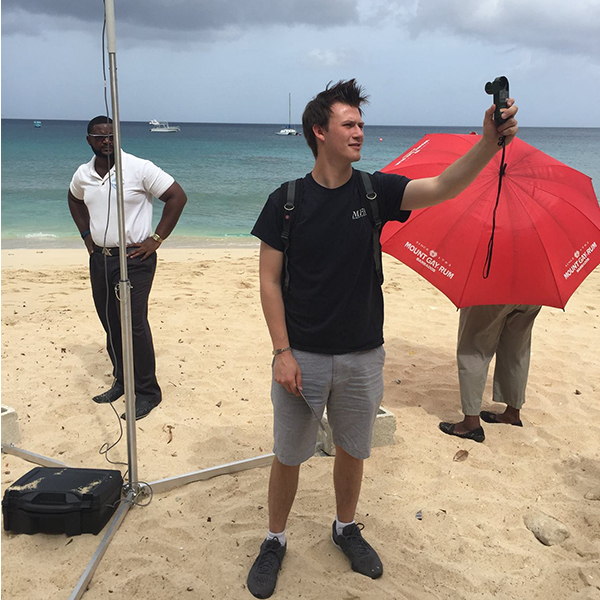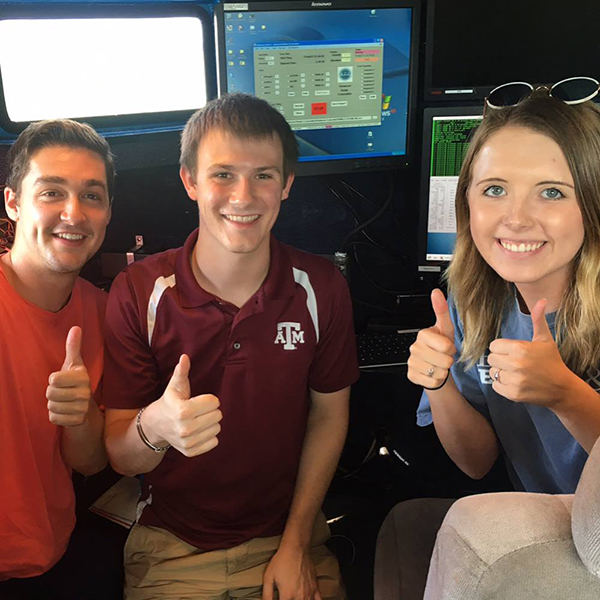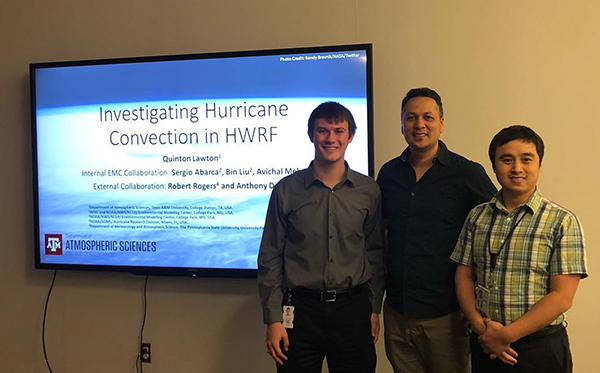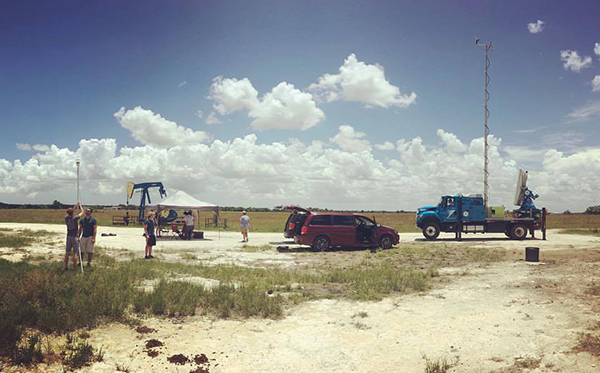Meteorology Student Contributed To Hurricane Forecast Model Improvements
Meet Quinton Lawton, whose life-long interest in meteorology, undergraduate research opportunities at Texas A&M, and NOAA internship have shaped his career path.
Nov 30, 2018

Quinton Lawton on a Barbados beach taking measurements. This took place on a sea-breeze study TAMU students conducted as part of a Meteorology study abroad on the island, in the summer of 2016.(Photo courtesy of Quinton Lawton)

Lawton and fellow Texas A&M meteorology students Ethan Williams (left) and Sarah Randall (right), operating the DOW-8. DOW stands for Doppler on Wheels, a mobile radar truck the department of meteorology used to conduct a field experiment on sea-breeze convection for a few weeks in the summer of 2017. (Photo Courtesy of Quinton Lawton)
While he always found the sky fascinating, it was not until Quinton Lawton witnessed the impact that Hurricane Ike left on his hometown of Cypress, Texas, that he immediately became interested in weather. He clearly remembers the storm and how it affected his neighborhood.
“I stayed up all night because it [Hurricane Ike] was exciting and scary,” Lawton said. “The next morning, I just remember going outside and seeing the trees down and seeing the impact on homes. We were out of electricity for two weeks, and I really saw how weather impacted people.”
“People spend their lives studying and predicting this. Hurricane Ike was a trigger in my mind and the push I needed to realize that this was something I wanted to do.”
From that point on, Lawton dedicated his life to becoming a meteorologist in hopes of better-predicting storms, to help communities better prepare.
Now well on his way to making those dreams happen, Lawton is a senior meteorology major in the Department of Atmospheric Sciences in Texas A&M University’s College of Geosciences.
The Journey To Aggieland
Having been intrigued by meteorology for most of his life, it was only natural that Lawton was drawn to a school with an extraordinary meteorology program. After attending the GeoX program, an immersive opportunity for high school students, Lawton knew Texas A&M was where he wanted to be.
“My junior year of high school, I applied to one of the programs put on by the College of Geosciences, the GeoX summer program, where prospective students are given a chance to learn about the geosciences,” he said. “You are here for a week and you get to live on campus and go to lectures and do all of these fun activities.”
When Lawton arrived at GeoX, he was set on studying meteorology, but undecided about which university to attend. Hands-on experiences during GeoX showed him the opportunities available in Texas A&M geosciences.
“We launched weather balloons and we were taking observations,” he said. “That really started to sell me on Texas A&M.”
“Other universities did not show me that when I went on tours. They had all of this cool stuff, but they never told me that undergraduates were allowed to use it.”
When he returned for his senior visit, he was impressed by the research experiences that undergraduates in meteorology got to have. They were “very involved in research and very involved in hands on activities like launching balloons, running the radar, and a lot of other stuff.”

Lawton, with Dr. Bin Liu and Dr. Sergio Garcia, after giving a presentation on the HWRF Hurricane Model. (Photo Courtesy of Quinton Lawton)

The DOW-8 truck in use. (Photo Courtesy of Quinton Lawton)
From Rooftops, To Hurricane Models, To Barbados
After choosing Texas A&M, Lawton jumped into undergraduate research soon after arriving in Aggieland. Freshman through junior year, he was heavily involved in the Texas A&M Green Roof Project undergraduate research program. There he had the opportunity to “learn about all of the cool instrumentation, and we took a poster to a national conference for that.”
Lawton was also able to conduct undergraduate research supervised by Dr. Robert Korty, associate professor of atmospheric sciences, in his sophomore year.
Dr. Robert Korty does research on tropic cyclones and climates,” Lawton said. “His focus is looking at climate simulations, generally paleo-climates, ice age and 20th century, and they model hurricanes in these climates to see how characteristics change; I have been working on this project with him and it has been an incredible experience.”
In the summer of 2016, Lawton took a two-week meteorology study abroad trip to Barbados, in the Caribbean. The students studied tropical meteorology, and the trip included “a lot of field study and sea-breeze study,” Lawton said.
“It was really cool to enjoy the culture while doing good, amazing science, with the Caribbean Institute for Meteorology and Hydrology.
In April 2018, Lawton gave a presentation at the 33rd annual American Meteorology Society Conference on Hurricanes and Tropical Meteorology: Intermodel Variability in Tropical Cyclones Downscaled from Paleoclimate Simulations.
He also wrote an undergraduate thesis on the research and is currently working on a related journal article to be published. The Department of Atmospheric Sciences and the College of Geosciences offer so many impactful experiences to undergraduate students, he said.
“You have to become comfortable reaching out to seize the opportunities that this college has to offer.”
Interning At NOAA
This past summer, Lawton had the opportunity to intern at the National Oceanic and Atmospheric Administration, in the Environmental Modeling Center (EMC).
“They actually run the operational forecast models used by the weather service to predict the weather,” he said. “One of the models that they run is the Hurricane Weather Research and Forecasting model (HWRF); this model is one of two that is essential for predicting hurricane intensity.”
Lawton was assigned to do a research project on this model and work with the scientists who work to improve it.
“This was probably the most impactful thing that I have ever done, because some of the work that I started there, will be used there every year to evaluate the model. So, some of my research project will be there for the time being. I can say that I was able to improve a hurricane model.”
He will present a poster at a national conference in January on that work, and he also had the opportunity to give a seminar at Texas A&M about it, “and meet some amazing scientists,” Lawton said.
After graduating in May 2019, he plans to eventually obtain a PhD and continue studying hurricanes and he has begun applying to graduate schools.
“Hurricanes is where I see myself going because it is very interesting and impactful,” he said. “There is a lot of talk about how do people listen, how can we make forecasts to communicate in a way that the public not only listens, but take action.”
“There is still a lot of great research to be done. I’m happy to be a part of it in any way that I can be. Ultimately my goal is to use research as a way to mitigate some of the impact that hurricanes have on people.”
By Rachel Swindell '19

